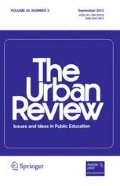Abstract
This article observes that participatory action research (PAR), by nature of being collaborative, necessitates making explicit theories of change that may have otherwise gone unseen or unexamined. The article explores the limits of the reform/revolution paradox on actions and theories of change in PAR. Citing examples from two recent youth PAR projects on educational issues, the author submits that when met with such a paradox, one can only move to a new vantage point. Four alternative vantage points, drawn from Indigenous epistemologies, are illustrated; they are sovereignty, contention, balance, and relationship.
Similar content being viewed by others
References
Adelman, C. (1997). Action research and the problem of participation. In R. McTaggart (Ed.), Participatory action research: International contexts and consequences (pp. 79–106). Albany, NY: State University of New York Press.
Alfred, G. R. (2005). Wasase: Indigenous pathways of action and freedom. Peterborough, Ont: Broadview Press.
Anzaldúa, G. (1999). Borderlands/La Frontera, the new Meztiza. San Francisco: Aunte Lute Press.
Boal, A. (2002). Games for actors and non-actors. London, NewYork: Routledge.
Brayboy, B. M. J. (2008). ‘Yakkity yak’ and ‘talking back’ an examination of sites of survivance in indigenous knowledge. In M. Villegas, S. R. Neugebauer, & K. R. Venegas (Eds.), Indigenous knowledge and education: Sites of struggle, strength and survivance. Cambridge, MA: Harvard Education Press.
Deloria, V. (1988). Custer died for your sins : An Indian manifesto. Norman: University of Oklahoma Press.
Denis, C. (1997). We are not you: First nations and Canadian modernity. Peterborough: Broadview Press.
Ferreira, E., & Ferreira, J. (1997). Making sense of the media: A handbook of popular education techniques. New York: Monthly Review Press.
Fine, M., Tuck, E., & Zeller-Berkman, S. (2007). Do you believe in Geneva? In C. McCarthy, A. Durham, L. Engel, A. Filmer, M. Giardina, & M. Malagreca (Eds.), Globalizing cultural studies. New York: Peter Lang Publications.
Gingrich-Philbrook, C. (2005). Autoethnography’s family values: Easy access to compulsory experiences. Text and Performance Quarterly, 25(4), 297–314.
Grande, S. (2004). Red pedagogy: Native American social and political thought. Lanham, Md: Oxford Rowman & Littlefield Publishers.
Grande, S. (2008). Educational desire as decolonization. In J. Cammarota & M. Fine (Eds.), Revolutionizing education: Youth participatory action research in motion. New York: Routledge.
Josselson, R. (2004). The hermeneutics of faith and the hermeneutics of suspicion. Narrative Inquiry, 14(1), 1–28.
Laenui, P. K. (1994). Straight talk on hawaiian sovereignty. http://www.opihi.com/sovereignty/hsacupda.txt, Last accessed May 13, 2008.
Lyons, S. R. (2007). In vine veritas. In E. Gansworth (Ed.), Sovereign bones. New York: Nation Books.
Smith, G. H. (2000). Protecting and respecting indigenous knowledge. In M. Battiste (Ed.), Reclaiming indigenous voices and vision (pp. 209–224). Vancouver: University of British Columbia Press.
Tuck, E. (2008). Theorizing back: An approach to participatory policy analysis. In J. Anyon, M. Dumas, D. Linville, K. Nolan, M. Perez, E. Tuck, & J. Weiss (Eds.), Using theory in empirical research on education. New York: Routledge.
Tuck, E., Allen, J., Bacha, M., Morales, A., Quinter, S., Thompson, J., et al. (2008). PAR praxes for now and future change. In J. Cammarota & M. Fine (Eds.), Revolutionizing education: youth participatory action research in motion. New York: Routledge.
Tuck, E. in conversation with Fine, M. (2007). Inner angles: A range of ethical responses to/with Indigenous and decolonizing theories. In N. Denzin & M. Giardina (Eds.), Ethical futures in qualitative research: Decolonizing the politics of knowledge. Walnut Creek, CA: Left Coast Press.
Vizenor, G. R. (1994). Manifest manners: Postindian warriors of survivance. Hanover, N·H: Wesleyan University Press, University Press of New England.
Zeller-Berkman, S. (2007). Act now, not only later! Taking action seriously in PAR. Chicago, IL: American Educational Research Association presentation.
Author information
Authors and Affiliations
Corresponding author
Rights and permissions
About this article
Cite this article
Tuck, E. Re-visioning Action: Participatory Action Research and Indigenous Theories of Change. Urban Rev 41, 47–65 (2009). https://doi.org/10.1007/s11256-008-0094-x
Published:
Issue Date:
DOI: https://doi.org/10.1007/s11256-008-0094-x




